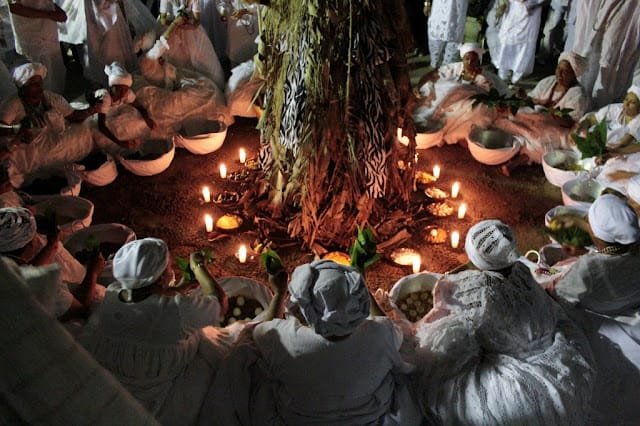If you’ve ever wondered why so many African communities pour water on the ground before a meal, speak to “the elders” in prayer, or light candles to honor the dead, the answer lies in the powerful role of ancestors. The role of ancestors in African Traditional Religion is both sacred and central, deeply woven into how millions of people across the continent live, pray, and understand their world.
From small village rituals to grand ceremonies, the role of ancestors in African Traditional Religion is much more than remembering the dead; it’s about acknowledging an ever-present connection with those who have walked before us. For those seeking spiritual depth, cultural understanding, or simply curiosity, this guide will explore who our ancestors are, what they do, and why they matter so deeply within African spirituality.
What Is African Traditional Religion?
To fully appreciate the role of ancestors, it’s helpful to first ask: What is African Traditional Religion?
African Traditional Religion (ATR) refers to the indigenous spiritual beliefs and practices that have developed among African communities for thousands of years, long before the arrival of Christianity or Islam. These religions are diverse, with practices that vary across ethnic groups, but they often share certain themes:
A belief in a Supreme Being (God)
Recognition of lesser spirits or deities
The centrality of community, nature, and ancestors
Oral transmission through stories, rituals, and songs
Unlike organized religions with scriptures, ATR is often unwritten, passed down through oral traditions and daily practices. It’s lived, not just believed.
Who Are the Ancestors in African Traditional Religion?
So, who exactly are the ancestors?
In ATR, ancestors are not simply dead relatives. They are the spiritually elevated members of a family who lived well, died in good standing with the community, and are believed to have crossed over into the spiritual realm. They continue to:
Watch over the living
Protect the family
Offer wisdom and guidance
Intercede between humans and the spiritual world
Not all who die become ancestors. To gain this revered status, one must have been respected, responsible, and morally upright in life. Ancestors are honored, not worshipped. The practice is often called ancestor veneration, not ancestor worship.
The Role of Ancestors in African Traditional Religion
So, what are the functions of ancestors in African Traditional Religion? What role do they play in people’s lives?
Let’s break it down.
1. Spiritual Intercessors
Ancestors act as intermediaries between the living and the Supreme Being (often called Olodumare, Nyame, Mulungu, etc.). Since God is considered too great or distant to approach directly, ancestors pass messages, prayers, and offerings from their descendants to the divine.
“If you want to speak to God,” a Yoruba elder once said, “speak to your ancestors, they will carry your voice.”
2. Guardians and Protectors
Ancestors are believed to:
Ward off evil
Prevent sickness or accidents
Warn loved ones through dreams or signs
Keep the family safe from misfortune
Many people offer food, drink, or prayers to their ancestors to stay in harmony with them.
3. Moral Guides and Correctors
If someone in the family acts in ways that dishonor tradition, such as lying, stealing, or neglecting family responsibilities, ancestors may withdraw their protection or send signs of disapproval. This could show up as sickness, bad luck, or family disputes.
Thus, ancestors serve as ethical guardians, reminding the living to live with integrity.
4. Keepers of Family and Cultural Identity
Ancestors are seen as the root of the family tree—the origin of one’s bloodline. Remembering them connects people to their history, customs, and original spiritual path.
Naming a child after an ancestor, preserving heirlooms, or practicing ancestral rituals keeps that identity alive.
5. Participants in Major Life Events
Ancestors are present during:
Births (to welcome a soul into the world)
Marriages (to bless the union)
Deaths (to guide the spirit of the departed)
Rites of passage (such as initiation into adulthood)
Families often call upon the ancestors during these moments, asking for blessings or guidance.
Real-Life Examples: Ancestor Veneration in African Communities
Let’s look at how this plays out across different African societies:
Yoruba (Nigeria)
The Yoruba, from Oyo State in Nigeria, believe in Egungun, a powerful ancestral spirit represented by masked dancers. During Egungun festivals, communities celebrate, consult, and receive blessings from their ancestors.
Zulu (South Africa)
Zulu people honor Amadlozi (the ancestors) through dreams, animal sacrifices, and beer offerings. When someone falls ill, it is common to consult a sangoma (spiritual healer) to see if an ancestor is unhappy or trying to communicate.
Akan (Ghana)
The Akan say prayers and pour libation (water or alcohol) to their ancestors before meals, ceremonies, or important decisions. It’s their way of showing respect and staying in spiritual alignment.
These practices affirm that ancestors in African Traditional Religion are not abstract figures—they are active, respected members of the spiritual community.
Ancestors and African Society
Beyond religion, the role of ancestors in African society is social and communal. They are seen as:
Founders of clans
Enforcers of social values
Unifiers across generations
When families face conflict, elders often say, “What would our ancestors think?” This moral authority creates a sense of responsibility, legacy, and accountability among the living.
Ancestral wisdom also guides agricultural practices, land inheritance, and leadership selection. In many rural areas, ancestral approval is sought before any major land decision.
What Happens If You Ignore Your Ancestors?
According to traditional belief, neglecting one’s ancestors can lead to:
Misfortune
Spiritual confusion
Loss of protection
Repeating generational mistakes
Many African families ensure regular offerings or prayers are made to maintain a harmonious relationship with the spirit world.
That’s why phrases like “the ancestors are angry” or “we need to appease the ancestors” still hold power across the continent.
Final Thoughts
Understanding the role of ancestors in African Traditional Religion helps us see that death is not the end—it is a transformation. Ancestors are not gone; they are with us, around us, and within us.
They walk with us as protectors, whisper guidance through dreams, and remind us to live with dignity. Whether you’re African, of African descent, or simply spiritually curious, you can learn a great deal about connection, respect, and continuity from ancestral traditions.
So next time you feel alone, confused, or in need of strength—pause. Light a candle. Pour a libation. Say their names.
Because your ancestors are listening.






